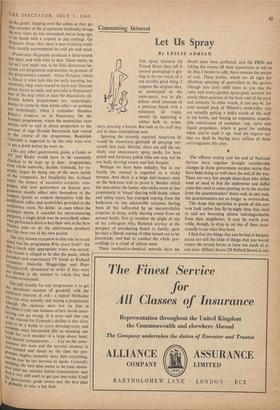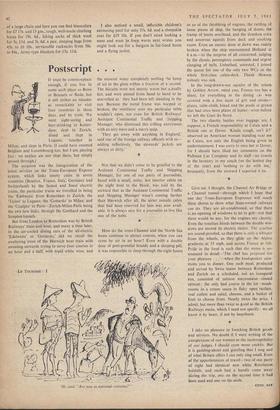Consuming Interest
Let Us Spray
By LESLIE ADRIAN THE spray business (in Poland Street they call it aerosol packaging) is get- ting to be too much of a not terribly good thing. I suppose the original idea, as prototyped in the scent-spray, was to dis- tribute small amounts of a precious liquid with a minimum of waste, merely by squeezing a rubber bulb or, nowa- days, pressing a button. But look at the stuff they put in these contraptions now.
Ignoring the recently reported American (it would be American) gimmick of spraying ver- mouth into your Martini, there are still the un- likely and unnecessary spray packs for boot polish and furniture polish (this one may not be too bad), shaving cream and hair lacquer.
Perhaps we have been unlucky, but in our family the aerosol is regarded as a tricky menace. And there is a large hair-lacquer stain on the bedroom wall to prove it. Besides which the man about the house, who sticks more or less consistently to 'steam' shaving with brush, cream and safety razor, has emerged roaring from the bathroom on one memorable occasion, having been all but suffocated by an uncontrollable eruption of slimy, sickly shaving cream from an aerosol bottle. Not to mention the plight of one of my colleagues who, flustered anyway at the prospect of introducing fianc6 to family, gave her hair a liberal coating of what turned out to be insecticide, and had to conduct the whole pro- ceedings in a cloud of odious scent.
These mechanico-chemical marvels have no doubt since been perfected, and the PROs are taking the covers off their typewriters to tell us so. But, I hasten to add, there remains the matter of cost. These bottles, which are all right for effortless spraying of pest-killers in the garden (though you can't refill them as you can the rusty and trusty garden spray-gun), account for nearly three-quarters of the basic cost of the pack and contents. In other words, if you pay 4s. for your aerosol pack of Whatsit's moth-killer you are actually getting a bob's worth of the stuff in the bottle, and buying an expensive, expend- able contrivance of container, cap, valve and liquid propellant, which is good for nothing when you've used it up. And the experts say that we shall be buying sixty million of these extravagances this year.
The affluent society and the end of National Service have together brought considerable changes in those government surplus stores that have been doing so well since the end of the war. There are very few people these days who either want or need to buy the underwear and duffel coats that used to come pouring on to the market from the quartermasters' stores and, in any case, the quartermasters are no longer so overstocked.
The shops that specialise in goods of this sort now look rather less fly-by-night than they used to and are becoming almost indistinguishable from their neighbours. It may be worth your while, though, to drop in on one of them occa- sionally to see what they have.
I find that the things that can be had at bargain prices are still the kind of things that you would expect the armed forces to have too much of at any time. Milieus Stores (29 Oxford Street) is one of a large chain and here you can find binoculars for £7 I 5s. and 15 gns., tough, well-made climbing boots for 79s. 6d., hiking socks of thick wool for 5s. lid, and 7s. 6d. a pair, sleeping bags from 45s. to £6 10s., serviceable rucksacks from 50s. to 84s., Army-type blankets for 15s. lid. I also noticed a small, inflatable children's swimming pool for only 37s. 6d. and a sheepskin coat for f19 10s. If you don't mind looking a mess and want to keep warm next winter you might look out for a bargain in fur-lined boots and a flying jacket.



























































 Previous page
Previous page